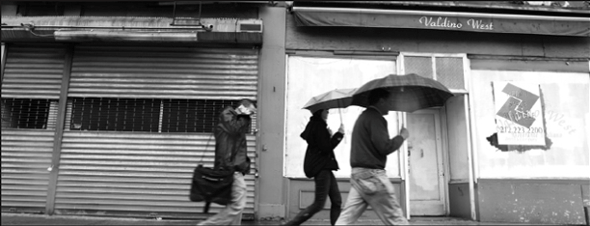By Rita Wu
The Meatpacking District’s transformation started in the late 1990s, as buildings formerly filled with refrigerated meat lockers became home to nightclubs and high-end retail stores.
Just south of the Meat Market is the West Village, which has been going through its own metamorphosis in recent years. Specifically, Hudson St. between 10th and 12th Sts. has recently seen numerous store closings, with 15 empty storefronts on these six blocks alone.
When asked why so many businesses on Hudson St. have been closing, a man who did not want to be identified replied, “It’s because of what’s going on across the street,” referring to Bleecker St. “It’s because of all the Marc Jacobs and Ralph Laurens. They are killing the Village,” the man said. “Ten years ago — mom-and-pop stores gone, restaurants gone, they’re all gone.”
The only way for merchants to avoid the pitfall of steep rent increases is to own their buildings, it seems.
“All the old businesses that are around are here because they were smart,” the man’s friend chimed in. “They bought the building. That’s how they stick around.” When asked why they themselves were still around, the second man responded, “Because our landlord is nice.”
A polling of surviving small businesses on this strip yielded a consensus that the reason for all the stores shutting down was because of “greedy landlords.” Once their lease was up, the merchants said, landlords jumped at the chance to increase their rent. The only businesses that seem to be able to afford these high rent increases are high-end retail stores and banks.
“They are able to pay the $60,000 a month rent,” one merchant said.
Alain Laurent, owner of La Ripaille on Hudson St., also owns the building in which the restaurant is located. He doesn’t think it’s fair that people immediately blame landlords.
“It’s a scapegoat,” he said. “I’ve been here since 1986 and I’ve had three tenants. I’m fair.” He blames the increase in vacancies on everything from taxes to water rates and insurance.
“Bloomberg is making it difficult for small businesses,” Ripaille said.
The space next to his restaurant also belongs to him and has sat empty since August. Ripaille had an offer from a laundromat, but the individuals were unable to pay the security and provide credentials. He passed on their offer.
He’d rather keep the space empty than have it occupied with the risk of the tenant being unable to pay the rent and also huge water and utilities bills. He thinks that most of the building owners on this stretch of Hudson St. have the same idea.
“You have to be feel secure at a time like this,” he said.





































